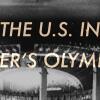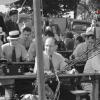July 1984 - Los Angeles Hosts the 1984 Summer Olympics

From July 28 to August 12, 1984, Los Angeles hosted the games of the 23rd Olympiad, considered by many to be one of the city's brightest moments, and resulting in one of the most financially-successful Olympic games in history.
Having already hosted a relatively-successful Olympiad in 1932 despite The Great Depression, boosters had wanted to see the games return to Los Angeles for decades. Many of the host cities prior to 1984 suffered tremendous deficits, most especially Montreal in 1976. When it came time to bid for the '84 games, many metropolises, fearful of debt, opted out, leaving Los Angeles as the only viable candidate to host the games.
With San Fernando Valley executive Peter Ueberroth tasked as the chairman of the Olympic organizing committee, the games' backers wanted to top the success of 1932, largely with the help of the existing resources of L.A.'s local entertainment industry. Veteran TV producer David Wolper was tasked with producing the opening and closing ceremonies. The Walt Disney Studios-designed official mascot, Sam The Olympic Eagle was an easily marketable fan favorite of the games from the in-person character to merchandise.
The games began on the afternoon of July 28 with a lavishly-produced opening ceremonies at the L.A. Memorial Coliseum, which featured a flying man wearing a jetpack, 84 pianists performing Gershwin's "Rhapsody In Blue," the debut performance of John Williams' iconic "Olympic Fanfare" composition, and gold medalist Rafer Johnson lighting the Olympic Flame atop the Coliseum's peristyle in dramatic fashion.

Marred only by a characteristically Cold War-era Soviet Union-led boycott by Eastern Bloc nations, the '84 Olympics still yielded 140 participating countries -- the highest number at the time -- with 6,829 athletes competing in 21 sports. The games propelled the athletic careers of runners Carl Lewis and Edwin Moses, gymnast Mary Lou Retton, and diver Greg Louganis, among many others. The Women's Marathon, Synchronized Swimming, and Rhythmic Gymnastics were also introduced at the '84 games.
The Olympics ended on August 12 with pop star Lionel Richie serenading 100,000 spectators and billions more on television with his hit, "All Night Long," joined by 2,000 breakdancers.
Many Angelenos feared catastrophic traffic jams during the games, which never occurred. Scheduled vacations, staggered work schedules, carpooling, and shuttle buses all contributed to create unprecedented, free-flowing conditions on Southern California streets and freeways.
When all was said and done, the '84 games not only averted debt but attained a $232.5 million budget surplus, achieved by utilizing existing professional and collegiate sports facilities and public recreation areas as venues, designating the UCLA and USC dormitories as athlete housing, and garnering the sponsorship of American corporate giants such as Coca-Cola and McDonald's. The surplus was used after the games to create the LA84 Foundation, a nonprofit organization that funds youth athletic programs across Southern California.
In a city already rich in professional and amateur athletics, the games also helped to initiate the first-ever annual L.A. Marathon in 1986, and helped the city host the FIFA World Cup a decade later. A bid for a third Olympiad in Los Angeles for 2024 is currently underway.
For the duration of the '84 Olympics, KCET aired the program, "A World Class Spectacular: The Olympic Arts Festival," featuring performances and coverage of the citywide arts event that preceded and coincided with the summer games for 10 weeks from June 2 to August 12. The festival, organized by CalArts President Robert Fitzpatrick, featured 400 performances by 146 theater, dance, and music companies from 18 nations representing all of the five continents symbolized by the Olympic rings. KCET's coverage was the only full-length program by a Los Angeles television station on the Olympics' celebration of the arts.


